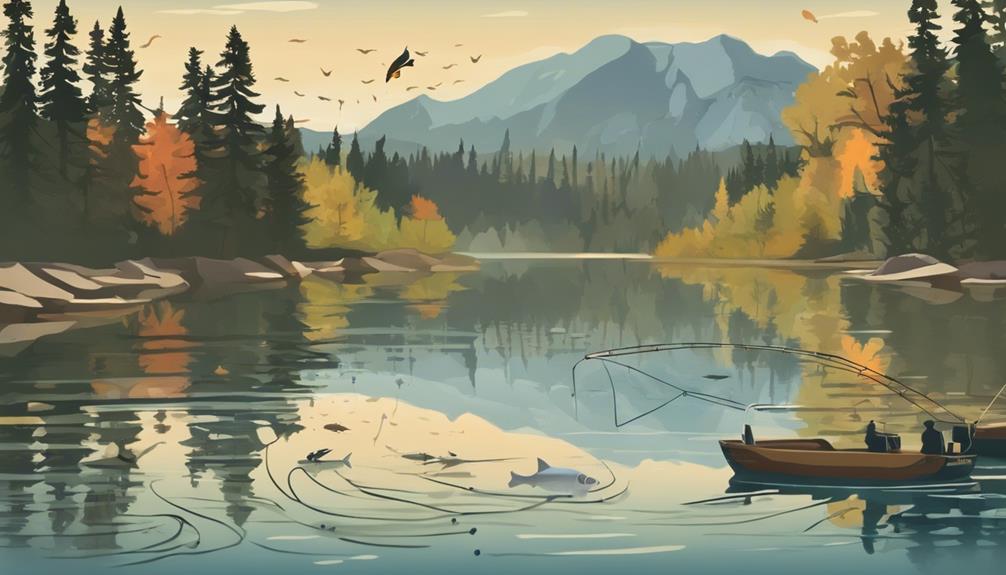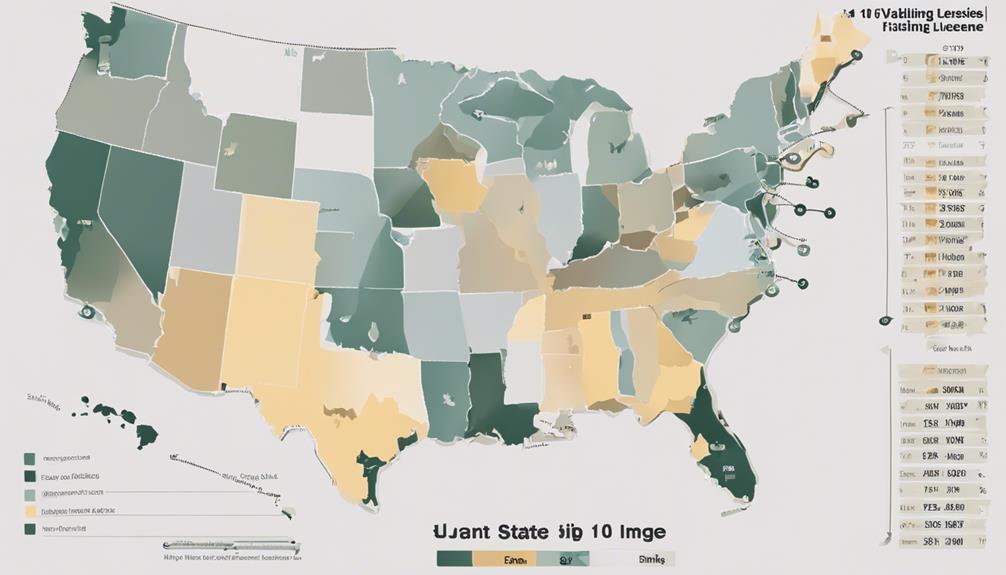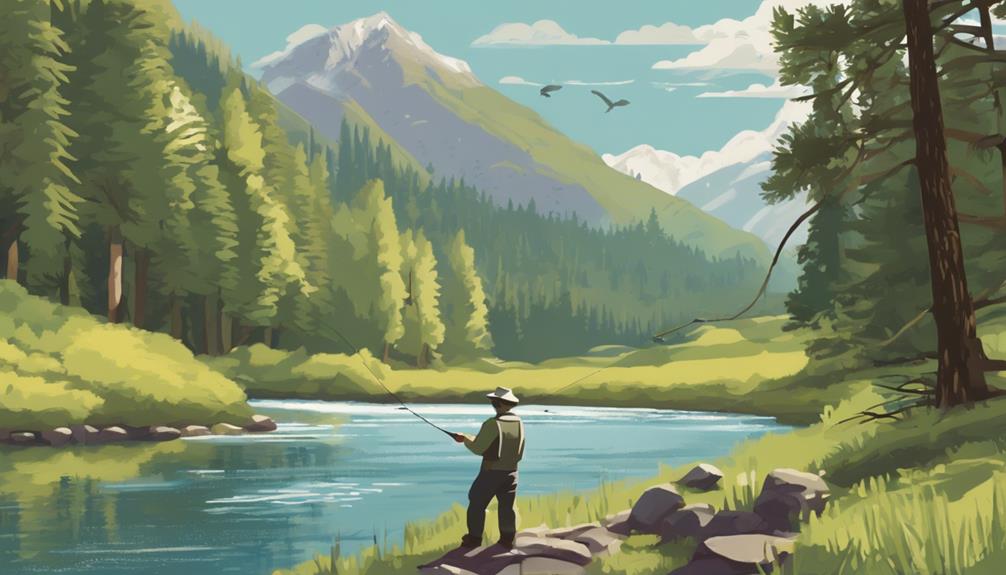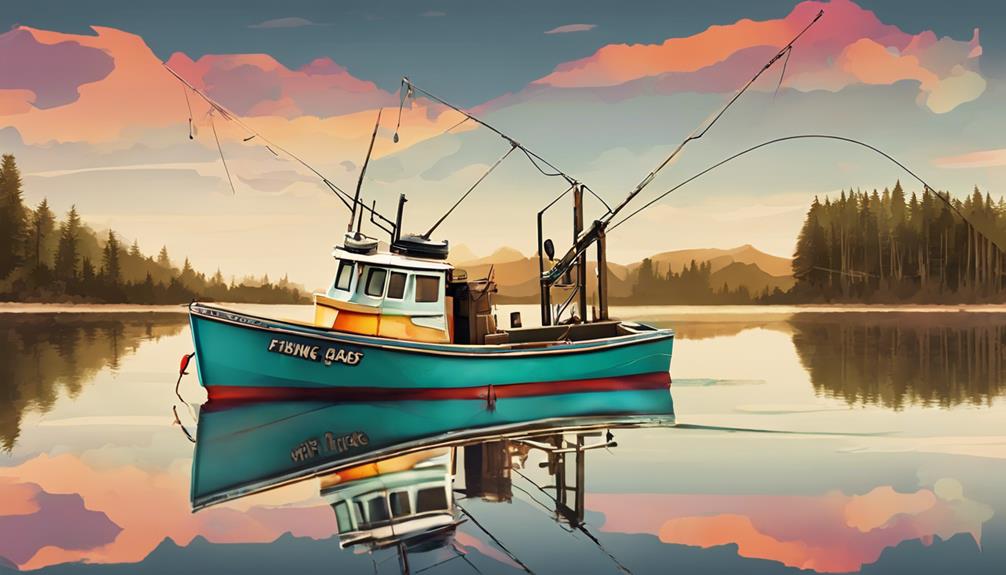Wondering how to ensure responsible fishing practices during the off-season? From understanding local regulations to supporting conservation efforts, there are crucial guidelines to follow.
But what are the other key practices that can help preserve fish populations and their habitats?
By implementing these strategies, you can contribute to sustainable fishing practices and ecosystem preservation.
Understanding Off-Season Fishing Periods
During off-season fishing periods, it's crucial to understand the specific regulations in place to protect fish populations and ensure sustainable fishing practices. Conservation awareness plays a vital role in maintaining a healthy fish population. Overfishing during the off-season can have a significant impact on the environment and the overall sustainability of fish stocks. By adhering to regulations and being aware of the importance of conservation, you contribute to the long-term well-being of fish populations.
Understanding the environmental impact of off-season fishing is key to promoting sustainable fishing practices. Unregulated fishing activities during the off-season can disrupt the natural balance of marine ecosystems, leading to a decline in fish populations and biodiversity. By recognizing the significance of sustainable fishing, you help minimize the negative effects on the environment and ensure that future generations can also enjoy the benefits of abundant marine life.
Checking Local Fishing Regulations
To ensure compliance with off-season fishing regulations and contribute to sustainable fishing practices, begin by checking local fishing regulations in your area. Understanding the fishing seasonality and local laws is crucial to avoid penalties and protect fish populations. Different regions have varying regulations regarding off-season fishing, so it's essential to stay informed.
Regulatory compliance is key when it comes to fishing during off-season periods. By checking local laws, you can ensure that you're fishing in permitted areas and following the designated fishing seasons. This not only helps in preserving fish populations but also maintains the balance of the ecosystem.
When checking local fishing regulations, pay close attention to specific fishing spots. Some areas may have restrictions during the off-season to allow fish populations to replenish. By being aware of these designated spots and respecting the regulations, you can help in the conservation of fish stocks for future generations of anglers to enjoy.
Obtaining Proper Fishing Licenses
Make sure you have the necessary fishing licenses before heading out to fish during the off-season. It's crucial to comply with license requirements and seasonal restrictions to ensure a smooth fishing experience. Here are some key points to consider:
- License Requirements: Before embarking on your fishing trip, check the specific license requirements in the area where you plan to fish. Different regions may have varying regulations regarding the type of license needed, whether it's a freshwater or saltwater permit, daily or annual license, or specific permits for certain species. Make sure you have the correct license to avoid fines or penalties.
- Seasonal Restrictions: Be aware of any seasonal restrictions that may be in place during the off-season. Some areas impose fishing bans or restrictions during certain times of the year to protect breeding populations or vulnerable species. Familiarize yourself with these restrictions and plan your fishing trips accordingly to respect conservation efforts and ensure sustainable fishing practices.
- License Renewal: Keep track of your license expiration date and make sure to renew it in a timely manner. Fishing with an expired license is illegal and can result in consequences. Stay informed about renewal procedures and any updates to fishing regulations to continue enjoying your fishing adventures legally.
Respecting Catch-and-Release Policies
After ensuring you have the proper fishing licenses, the next crucial step is to understand and adhere to catch-and-release policies to promote sustainable fishing practices. Proper handling of fish is essential when practicing catch-and-release.
When you land a fish, avoid causing unnecessary harm by using barbless hooks to facilitate an easy release. Keep the fish in the water as much as possible, only lifting it for a quick photo before gently returning it to its natural habitat. This reduces stress and increases the fish's chances of survival after being caught.
It is imperative to follow ethical practices when engaging in catch-and-release fishing. Always use the right gear for the size of fish you're targeting to minimize injury during the retrieval process. Additionally, avoid playing the fish for too long as it can exhaust them to the point of no return. Quick and efficient releases are key to maintaining healthy fish populations.
Adhering to Size and Bag Limits
Ensure compliance with regulations by familiarizing yourself with size and bag limits before embarking on your fishing excursion. It's essential to understand the restrictions in place to protect fish populations and ensure sustainable fishing practices. Here are some key points to consider:
- Size Limits: Different species of fish have specific size limits that must be adhered to. These limits are in place to allow fish to reach maturity and reproduce before being caught. Measure your catch accurately to ensure it meets the size requirements set by regulations.
- Bag Limits: Bag limits refer to the maximum number of fish an individual is allowed to keep in a single day. Exceeding these limits can have detrimental effects on fish populations. Be mindful of the bag limits for each species you're targeting and only keep what's allowed.
- Compliance Checks and Penalties: Authorities often conduct compliance checks to ensure anglers are following size and bag limits. Penalties for non-compliance can include fines, confiscation of equipment, and even legal action. It's crucial to respect these limits not only for the well-being of fish populations but also to avoid facing penalties for violations.
Reporting Illegal Fishing Activities
When observing illegal fishing activities, promptly report them to the appropriate authorities to uphold conservation efforts and maintain the integrity of fishing regulations. Reporting such activities is crucial in protecting the environment and ensuring that fishing practices remain sustainable for future generations. If you witness any violations, don't hesitate to take action by providing anonymous tips to law enforcement agencies.
Anonymous tips play a vital role in combating illegal fishing. By maintaining your anonymity, you can help authorities investigate and address these violations effectively. When reporting illegal fishing activities anonymously, you contribute to the enforcement of regulations without putting yourself at risk.
Law enforcement agencies rely on the support and cooperation of the community to identify and address illegal fishing practices. Your reports can lead to investigations that result in the apprehension of individuals who disregard fishing regulations. By reporting violations promptly, you actively participate in upholding the law and protecting the aquatic ecosystems.
Knowing Closed Fishing Areas
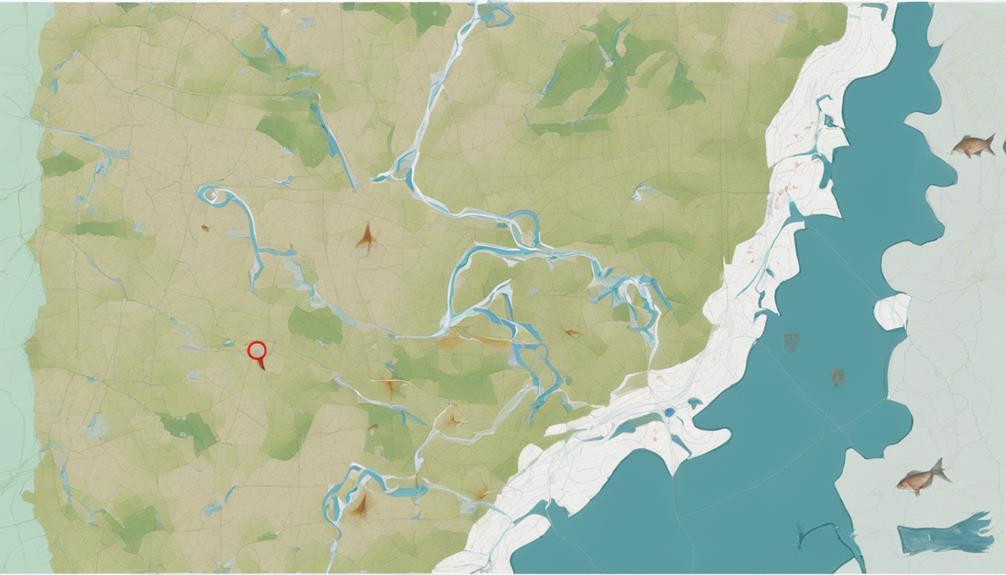
To ensure compliance with fishing regulations, it's essential to be aware of closed fishing areas in order to protect marine resources effectively. Knowing where you can and can't fish helps safeguard vulnerable ecosystems and allows fish populations to thrive.
Here are some key points to consider when it comes to closed fishing areas:
- Conservation Zones and Restricted Access: Conservation zones are designated areas where fishing activities are limited or prohibited to conserve marine life. These areas are crucial for protecting endangered species, allowing them to recover without human interference. Be sure to research and familiarize yourself with these zones to avoid unknowingly fishing in restricted areas.
- Protected Habitats with No Fishing: Some areas serve as protected habitats where fishing is strictly forbidden. These habitats are often breeding grounds for various species and are essential for maintaining biodiversity. By respecting these restrictions, you contribute to the preservation of delicate ecosystems and help sustain healthy fish populations for the future.
- Understanding Boundaries and Regulations: It's important to understand the boundaries of closed fishing areas and the specific regulations that apply to each zone. Familiarize yourself with maps, signage, and local guidelines to ensure you stay within legal fishing grounds and avoid inadvertently causing harm to sensitive marine environments. Compliance with these regulations is key to promoting sustainable fishing practices and conserving our oceans for generations to come.
Supporting Conservation Efforts
By actively participating in conservation efforts, you can make a meaningful impact on protecting marine ecosystems and supporting sustainable fishing practices. Conservation awareness is key to understanding the delicate balance of marine environments. Educating yourself and others about the importance of preserving these ecosystems can lead to more informed decisions when engaging in fishing activities.
Community involvement plays a crucial role in conservation efforts. By working together with local groups and organizations, you can contribute to larger-scale initiatives aimed at protecting marine habitats and species.
Sustainable practices are essential for minimizing the environmental impact of fishing. By adopting sustainable fishing methods, such as catch-and-release, using biodegradable gear, and respecting catch limits, you can help ensure the long-term health of marine populations. Being mindful of your environmental footprint while fishing is paramount. Avoiding littering, properly disposing of fishing lines and other waste, and respecting protected areas are simple yet effective ways to support conservation efforts.
Frequently Asked Questions
Can I Fish During the Off-Season if I Have a Valid Fishing License?
You can't fish during the off-season even with a valid license. Catch limits are in place to protect fish populations for the future.
Conservation efforts are crucial to maintaining a healthy ecosystem. Make sure to follow regulations to ensure fish populations stay stable.
Are There Any Specific Penalties for Fishing in Closed Areas During the Off-Season?
If you fish in closed areas during the off-season, penalty consequences may apply. It's important to respect these restrictions to protect the marine environment and fish populations.
Stay informed about designated fishing areas and seasons to avoid any legal issues. Ignoring closed areas can result in fines, license suspensions, or other penalties.
Always check local regulations and guidelines before heading out to fish to ensure you're following the rules.
How Can I Stay Informed About Any Changes in Off-Season Fishing Regulations?
To stay informed about off-season fishing regulations, keep an eye on fishing newsletters, online forums, and social media updates. Attend local workshops for firsthand info. Engaging with these resources will help you stay up-to-date on any changes in regulations.
Stay connected to the fishing community through these channels to ensure you're always in the know about off-season rules and guidelines.
What Steps Can Anglers Take to Minimize Their Impact on Fish Populations During the Off-Season?
To minimize your impact on fish populations during the off-season, anglers should follow conservation practices. Utilize sustainable fishing techniques like catch and release, using barbless hooks, and handling fish with care.
Avoid overfishing by adhering to catch limits and size restrictions. Respect marine habitats and ecosystems by properly disposing of fishing line and other waste.
Are There Any Exceptions to Catch-And-Release Policies During the Off-Season for Certain Species?
During the off-season, exceptions to catch-and-release policies may exist for certain species based on species specific regulations. These exceptions are typically in place to support conservation efforts and promote sustainable practices.
It's important to stay informed about any changes to regulations for different species to ensure you're fishing responsibly and protecting fish populations for the future. Always check local guidelines and regulations before heading out to fish during the off-season.
Conclusion
Now that you know the 9 best practices for off-season fishing regulations, you can enjoy a successful and responsible fishing experience.
Remember to always check local regulations, obtain proper licenses, respect catch-and-release policies, adhere to size and bag limits, report any illegal activities, know closed fishing areas, and support conservation efforts.
By following these guidelines, you can help protect our aquatic ecosystems and ensure sustainable fishing for future generations.
Happy fishing!
